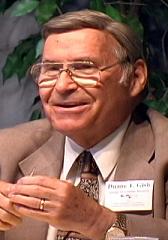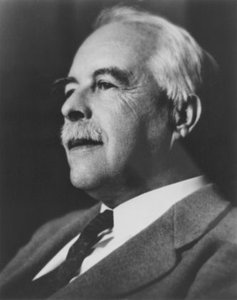A Quote by Ilya Prigogine
It is a remarkable fact that the second law of thermodynamics has played in the history of science a fundamental role far beyond its original scope. Suffice it to mention Boltzmann's work on kinetic theory, Planck's discovery of quantum theory or Einstein's theory of spontaneous emission, which were all based on the second law of thermodynamics.
Related Quotes
Of all the statements that have been made with respect to theories on the origin of life, the statement that the Second Law of Thermodynamics poses no problem for an evolutionary origin of life is the most absurd… The operation of natural processes on which the Second Law of Thermodynamics is based is alone sufficient, therefore, to preclude the spontaneous evolutionary origin of the immense biological order required for the origin of life.
If someone points out to you that your pet theory of the universe is in disagreement with Maxwell's equations - then so much the worse for Maxwell's equations. If it is found to be contradicted by observation - well, these experimentalists do bungle things sometimes. But if your theory is found to be against the second law of thermodynamics I can give you no hope; there is nothing for it but to collapse in deepest humiliation.
Enchanting is not the word that would immediately spring to mind when describing a play that deals with fractal geometry, iterated algorithms, chaos theory and the second law of thermodynamics, but it is a perfect fit for Tom Stoppard's astonishing 1993 play, which is as beautiful as it is brilliant. This is one Stoppard drama that you don't have to be Einstein to understand -- you can feel it as well as think it. (...) Breathtaking, exhilarating and deeply satisfying.
In fact, the science of thermodynamics began with an analysis, by the great engineer Sadi Carnot, of the problem of how to build the best and most efficient engine, and this constitutes one of the few famous cases in which engineering has contributed to fundamental physical theory. Another example that comes to mind is the more recent analysis of information theory by Claude Shannon. These two analyses, incidentally, turn out to be closely related.
Evolution in the biosphere is therefore a necessarily irreversible process defining a direction in time; a direction which is the same as that enjoined by the law of increasing entropy, that is to say, the second law of thermodynamics. This is far more than a mere comparison: the second law is founded upon considerations identical to those which establish the irreversibility of evolution. Indeed, it is legitimate to view the irreversibility of evolution as an expression of the second law in the biosphere.
Every heat engineer knows he can design his heat engine reliably and accurately on the foundation of the second law [of thermodynamics]. Run alongside one of the molecules, however, and ask it what it thinks of the second law. It will laugh at us. It never heard of the second law. It does what it wants. All the same, a collection of billions upon billions of such molecules obeys the second law with all the accuracy one could want
In the complex course of its evolution, life exhibits a remarkable contrast to the tendency expressed in the Second Law to Thermodynamics. Where the Second Law expressed an irreversible progression toward increased entropy and disorder, life evolves continually higher levels of order. The still more remarkable fact is that this evolutionary drive to greater and greater order also is irreversible. Evolution does not go backward.
Nothing in life is certain except death, taxes and the second law of thermodynamics. All three are processes in which useful or accessible forms of some quantity, such as energy or money, are transformed into useless, inaccessible forms of the same quantity. That is not to say that these three processes don't have fringe benefits: taxes pay for roads and schools; the second law of thermodynamics drives cars, computers and metabolism; and death, at the very least, opens up tenured faculty positions.
It is often said that the progression from simple to complex runs counter to the normal statistics of chance that are formalized in the Second Law of Thermodynamics. Strictly speaking, we could avoid this criticism simply by insisting that the Second Law does not apply to living systems in the environment in which we find them. For the Second Law applies only when there is no overall flow of energy into or out of a system, whereas all living systems are sustained by a net inflow of energy.
I had two passions when I was a child. First was to learn about Einstein's theory and help to complete his dream of a unified theory of everything. That's my day job. I work in something called string theory. I'm one of the founders of the subject. We hope to complete Einstein's dream of a theory of everything.
What is especially striking and remarkable is that in fundamental physics, a beautiful or elegant theory is more likely to be right than a theory that is inelegant. A theory appears to be beautiful or elegant (or simple, if you prefer) when it can be expressed concisely in terms of mathematics we already have. Symmetry exhibits the simplicity. The Foundamental Law is such that the different skins of the onion resemble one another and therefore the math for one skin allows you to express beautifully and simply the phenomenon of the next skin.
Professor Eddington has recently remarked that 'The law that entropy always increases - the second law of thermodynamics - holds, I think, the supreme position among the laws of nature'. It is not a little instructive that so similar a law [the fundamental theorem of natural selection] should hold the supreme position among the biological sciences.




































